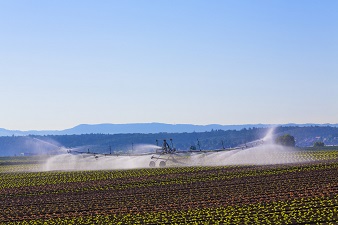Less does more with smart irrigation

Related topics
Agriculture & Forestry Innovation Societal Challenges Sustainable agriculture and forestry Denmark Greece Italy Netherlands Portugal Spain United Kingdom Israel Food security, sustainable agriculture and forestry, maritime and martime inland water research and bio-economydate: 08/06/2015
Project: Flexible and PrecIse IrriGation PlAtform...
acronym: FIGARO
See also: CORDIS
The FIGARO decision support system combines crop growth models with data from satellites, weather stations and field-based sensors to recommend optimal water use for individual fields. Most data input is automatic, minimising the set-up time farmers spend with the application.
Advice is calculated on a processing platform that was designed to work with a wide range of crop models and data sources. This gives users the flexibility to start with a small investment in the basic decision support technology, then add sensors and other data sources later for more precise irrigation strategies.
FIGARO was set up to show that precision irrigation advice systems can be user-friendly and cost-effective. “Farmers are very risk-adverse,” says project coordinator Lior Doron of Israeli-based irrigation company Netafim. “We need to convince them the tool will improve their results.”
Estimates from the project suggest that the system can save 20-60% of users’ irrigation water for the same yield of crop, with a starting investment of €5-20 per hectare. The exact saving depends on the season and other variables. The system can also help reduce fertiliser use. Precise irrigation keeps nutrients around plants’ roots and avoids them flowing away or penetrating the deep soil in excess water, which can occur in over-irrigation.
As well as boosting the sustainable use of resources and cutting pollution, the FIGARO system can make it easier for farmers to comply with EU rules on water productivity and help policy-makers monitor farming practice.
User-friendly
FIGARO’s decision support system is part of a trend to use technology to help farmers make the best use of water for high water-consuming crops such as potatoes, citrus fruit or maize. “In the last 10-15 years, there has been a lot of activity in using sensors and remote imaging to irrigate more precisely,” says Doron.
However, many existing decision support systems ask farmers to input large amounts of data, which is time-consuming and very technical. With the FIGARO application, a system provider sets up automatic feeds from weather stations and field sensors while growers simply add more stable data such as crop types and boundaries for each field.
Once the parameters are set up, the application sends users a customised seven-day scheduling plan for irrigation and fertigation (applying fertilisers through the irrigation system), which is updated daily. To increase accuracy, farmers can add commercial wireless sensors to their fields, to include soil and plant data in the calculations.
Users access the system through a computer or tablet linked to a modem unit in their office. While this can be linked directly to an automated irrigation controller, farmers can simply use the advice to inform their own decisions and the system will adapt its recommendations to their action.
Further development
The FIGARO system is built around a processing platform developed by project partner Hidromod, a Portuguese SME. Netafim provided the interface and field data management system. Other partner SMEs developed specialist parts for the system, while the academic partners provided irrigation-decision models.
Field tests are running in 11 sites around Europe and Israel, representing different climate zones. “We now have a version that works but not the full interface,” says Doron. “Next year we will have the full software.”
In the final year, demonstrations in seven sites will test the application’s viability. Once the project is over, other researchers or businesses can use FIGARO’s open interface and platform to develop their own irrigation applications.
The project’s researchers are also considering developing an Android- and I-Phone-based system, says Doron, which would increase access options for farmers.
Data from the research will be summarised on the project website. However, the source code that controls the FIGARO platform is being kept secret to protect the intellectual property rights of the consortium.
“I was positively surprised by the project’s extra benefits,” says Doron. “We would not usually have the chance to cooperate with leading academics and other companies.”
Some of the team are now applying for Horizon 2020 funding to use their collective expertise in a new project on biological fertiliser.
